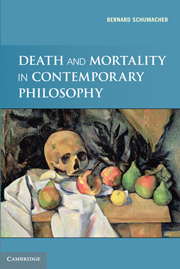Book contents
- Frontmatter
- Contents
- Preface
- Introduction
- Part One Human Personal Death
- Part Two Theory of Knowledge About Death
- 2 Scheler’s Intuitive Knowledge of Mortality
- 3 Heidegger’s Being-Towards-Death
- 4 Is Mortality the Object of Foreknowledge?
- 5 Inductive Knowledge of Death and Jean-Paul Sartre
- 6 Knowledge of Mortality Is Inseparable from the Relation to the Other
- 7 Death as the Object of Experience
- Part Three Does Death Mean Nothing To Us?
- Conclusion
- Bibliography
- Index of Names
- Index of Concepts
2 - Scheler’s Intuitive Knowledge of Mortality
Published online by Cambridge University Press: 05 June 2012
- Frontmatter
- Contents
- Preface
- Introduction
- Part One Human Personal Death
- Part Two Theory of Knowledge About Death
- 2 Scheler’s Intuitive Knowledge of Mortality
- 3 Heidegger’s Being-Towards-Death
- 4 Is Mortality the Object of Foreknowledge?
- 5 Inductive Knowledge of Death and Jean-Paul Sartre
- 6 Knowledge of Mortality Is Inseparable from the Relation to the Other
- 7 Death as the Object of Experience
- Part Three Does Death Mean Nothing To Us?
- Conclusion
- Bibliography
- Index of Names
- Index of Concepts
Summary
Introduction
There is something paradoxical about the human being. On the one hand, he is not content merely with simply being “carried along by [life’s] impetus”, to borrow Bergson’s expression, but rather seems to have a consciousness of his mortality and of the fact that he must and can die, that he “knows that it must die”, the fact that his death could occur at any moment – “Mors certa, hora incerta” (Death is a sure thing; the hour – uncertain). But on the other hand, to use one of Kierkegaard’s expressions, he lives by a deception, “a false flatterer” (he flatters himself in his thoughts by complacently preferring the security of the moment, procrastination, and postponement), and in the conscious or unconscious refusal to face death, a confrontation that is, according to Kierkegaard, the result of serious thought. I do not want to dwell on the reasons for this repression of death, but rather to discuss the way in which a human being arrives at the consciousness of his death. How does a human being arrive at the certitude that he must die, and what arguments form the basis for the statement that “death is the only certainty”? Heidegger goes so far as to describe death as the foundation for all certitudes. Contemporary philosophy proposes several answers: the intuitive, ontological, or innate knowledge of my death; knowledge obtained by inductive reasoning or interpersonal contact. In the following chapters I will examine these proposed explanations and give a detailed analysis of their supporting arguments.
Scheler is one of those “philosophers of life” who rejected certain currents in scientific thinking that took mechanism and finalism to the extreme of considering death as a more or less catastrophic event external to the individual and comparable to a mechanical, artificial accident. In the first section of his posthumous work entitled Death and Afterlife, written between 1914 and 1919, he defends the notion of natural death (I will return to this concept) and thus distances himself also from German idealism, which maintains that death does not affect a human being. According to Scheler, every living being is essentially characterized by “the internal exhaustion of the vital agents that guide the development of the species”. Death is a phenomenon “that is connected with the essence of the living thing”; it is part of “the form and structure” of all life. Life is inconceivable without death. Scheler, along with Simmel, prepares the way for Heidegger’s thought: death does not occur as an accident or a catastrophe, as Sartre and Levinas maintain, but rather as a natural event, since human life is directed toward death. In order to prove his thesis, Scheler does not use the experimental method that is dear to classical empiricism but adopts an innovative approach by referring to an intuitive knowledge of mortality.
- Type
- Chapter
- Information
- Death and Mortality in Contemporary Philosophy , pp. 51 - 60Publisher: Cambridge University PressPrint publication year: 2010

